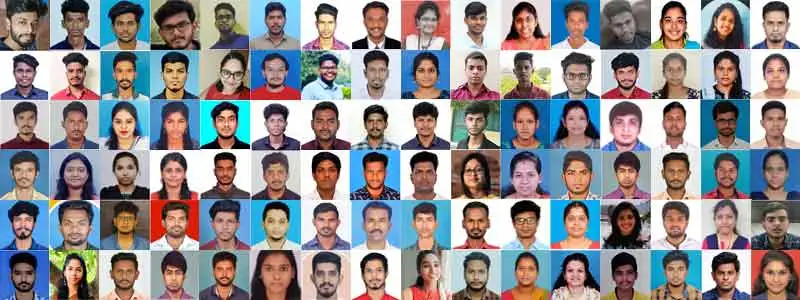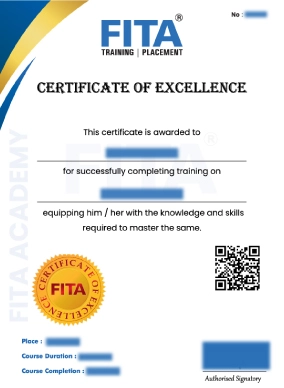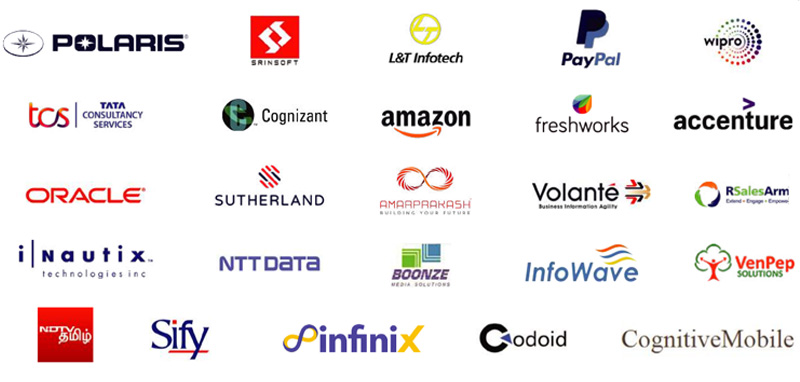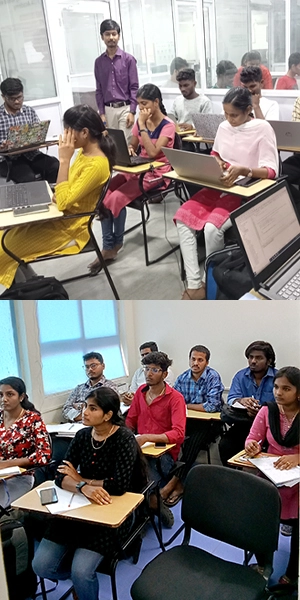Course Highlights and Why Data Science Courses in Bangalore at FITA Academy?
Upcoming Batches
- 17-04-2025
- Weekdays
- Thursday (Monday - Friday)
- 19-04-2025
- Weekend
- Saturday (Saturday - Sunday)
- 21-04-2025
- Weekdays
- Monday (Monday - Friday)
- 26-04-2025
- Weekend
- Saturday (Saturday - Sunday)
Classroom Training
- Get trained by Industry Experts via Classroom Training at any of the FITA Academy branches near you
- Why Wait? Jump Start your Career by taking the Data Science Training in Bangalore!
Instructor-Led Live Online Training
- Take-up Instructor-led Live Online Training. Get the Recorded Videos of each session.
- Travelling is a Constraint? Jump Start your Career by taking the Data Science Online Course!
Data Science Course Objectives
- Understand the fundamentals of Data Science, including its life cycle, and explore the basics of Artificial Intelligence (AI).
- Introduction to Python or R programming, its various versions and a comprehensive study of the programming languages. Students can choose between either of them.
- Learn about Fundamental Statistics, Statistical Analysis and its uses and advantages, and understanding of Inferential and Descriptive Statistics.
- Gain insights into machine learning models, their selection, training, and evaluation. Understand predictive modeling, linear and polynomial regression, multilevel models, and algorithm boosting.
- Explore supervised learning algorithms (e.g., Logistic Regression, Naïve Bayes, SVM) and unsupervised learning algorithms (e.g., K-means, Hierarchical Clustering, Dimensionality Reduction).
- Get hands-on practice by working on real-time capstone projects included in the Data Science Training in Bangalore.
Data Science Course Syllabus
Introduction to Python
- Overview of Python
- Beginning with Python
- Introduction to the installation of Python
- Introduction to Python IDE's and Editors like Canopy, Pycharm, Jupyter, Rodeo, and Ipython
- Understanding the Jupyter notebook and Customize Settings
- Concept of Packages and Libraries
- Important packages like NumPy, SciPy, Sci-kit-learn, Pandas, and Matplotlib
- Installation of loading Packages and the Name Spaces
- Data Types
- Data structures/objects (strings, Tuples, Lists, and Dictionaries)
- Dictionary and List Comprehensions
- Value Labels and Variable including Time Values and Date
- Basic Operations - string- Mathematical - date
- Reading data
- Writing data
- Simple plotting
- Conditional statements and Control flow
- Code profiling and Debugging
Scientific Distributions that are used in Python for Data Science
- Numpy
- Scify
- Pandas
- Scikitlearn
Importing/ Accessing and Exporting Data using the Python modules
- Importing Data from different sources which include (CSV, Excel, txt, and access, etc)
- Database Input (Connecting to the database)
- Viewing Data objects - methods and subsetting
- Exporting Data to different formats
- Important Python modules: Pandas
Data Manipulation - Cleansing - Munging using the Python modules
- Cleansing the Data with Python
- Data Manipulation steps(Sorting, duplicates, subsetting, filtering, merging, appending, sampling, derived variables, Data type conversions, renaming, and formatting)
- Data manipulation tools (Operators, Loops Packages, Functions, Control structures, and arrays)
- Python inbuilt functions (Text, Date, numeric, date, and utility functions)
- Python User for Defined Functions
- Stripping out the extraneous information
- Normalizing data
- Formatting data
- Important Python modules for Data manipulation (Pandas, Numpy, re, math, string, and DateTime)
Data Analysis - Using Visualization Python
- Introduction to exploratory data analysis
- Descriptive statistics, Summarization, and Frequency Tables
- Univariate Analysis (Graphical Analysis and Distribution of data )
- Bivariate Analysis(Cross Tabs, Distributions, Relationships, and Graphical Analysis)
- Creating Graphs- Bar/Line chart/Histogram/ Scatter/ Boxplot/Pie/Density )
- Significant Packages for Exploratory Analysis (NumPy, Arrays, Pandas, Matplotlib, and Scipy.stats)
Basic statistics and implementation of stats methods in the Python
- Fundamentals of Statistics - Measures of Variance and Central Tendencies
- Building Blocks
- Probability Distributions
- Normal Distribution
- Central Limit Theorem
- Inferential Statistics -Sampling
- Concept of the Hypothesis Testing
- Statistical Methods - Z/t-tests
- Test based on One sample, independent, paired
- ANOVA, Chi-square, and Correlation
- Modules that are important for statistical methods: Numpy, Scipy, and Pandas
Machine Learning
Predictive Modeling - Basics
- Introduction to Predictive Modeling and Machine Learning
- Kinds of Business problems include Mapping Techniques -classification versus segmentation - Regression versus classification - Segmentation versus Forecasting
- Important Classes of the Learning Algorithms
- Supervised versus Unsupervised Learning
- Numerous Phases of Predictive Modeling
- Data Pre-processing
- Sampling
- Model Building
- Validation
Applications and Machine Learning Algorithms - Steps implemented in Python
- Linear Regression
- Segmentation
- Cluster Analysis (K-Means)
- Support Vector Machines(SVM)
- Decision Trees (CART/CD 5.0)
- Other Techniques (KNN, and Naïve Bayes)
- Important Python modules for Machine Learning (SciKit Learn and scipy)
Deep Learning
- Artificial Neural Networks(ANN)
Data Science With R Programming Syllabus
Introduction to R Programming
- History of R
- Features of R
R studio
- Introduction to the R studio
- Advantages of using the R studio
- Installation of R in the system
- Setting up of workspace
- Windows in the R studio
Packages
- Introduction to packages
- Configuring and loading packages
- Managing packages
R Programming language Syntax
- Command prompt
- R script file
- Comments
Object Types
- Vectors
- Arrays
- Matrices
- Factors
- Lists
- Data Frames
Vectors
- Kinds of vectors
- Character
- Numeric
- Raw
- Integer
- Logical
- Complex
- Creation of vectors
- Creation of multiple elements vectors
- Accessing vector elements
- Manipulating vectors
Matrices
- Creation of matrices
- Accessing the elements of a matrix
- Computation and Matrix processing
Arrays
- Creation of arrays
- Naming rows and columns
- Accessing the array elements
- Manipulation of array elements
Lists
- Creation of list
- Naming list elements
- Accessing list elements
- Manipulation of list elements
Factors
- Creation of factors
- Factors in the data frame
- Changing the level of order
- Generation of factor levels
- Conversion of characters to factors
Data frames
- Creation of data frames
- The distinction between the matrix and data frame
- Subsetting data from the data frame
- Extract data from the data frame
- Joining columns and rows in the data frame
- Merging of data frames
Converting data types using the functions
- as.numeric ,as.character,as.matrix, and as.data.frame
Checking the data types using functions
- Is.character, is.numeric,is.matrix, and is.data.frame
Operators
Kinds of operators
- Arithmetic operators
- Relational operators
- Logical operators
- Assignment operators
- Miscellaneous operators
Decision-making statements
- If statements
- If-else statements
- Switch statements
Loops
- Repeat loop
- While loop
- For loop
Loop control statements
- Break statements
- Next statements
Functions
- Definition of function
- Function components
Types of function
- Inbuilt function
- User-defined function
Kinds of built-in functions
- Character function
- String functions
- Numeric function
- Statistical function
- Time and Date function
User-defined functions
- Creation of function
- Calling of function
- Lazy evaluation of the function
Overview of the Important R Packages
- dplyr
- stringr
- ggplot
- ggplot2
Tools
Statistical Analysis
- Descriptive statistics
- A measure of central tendency
- Inferential statistics
- Hypothesis testing
- Exploratory data analysis
Data Visualization
- Pie charts
- Bar charts
- Box plots
- Histograms
- Line graphs
- Scatter plots
Introduction to Machine Learning
- History and Origin of Machine Learning
- The distinction between Machine Learning and AI
- Differences between Data Science, Data mining, Statistics, and Machine learning
- Applications of Machine Learning
- Limitations of Machine Learning
- Future of Machine Learning
- Implementing Machine Learning in R - programming
Machine Learning Process
- Collecting data
- Preparing data and Pre-processing
- Choosing a model
- Exploring data
- Training the model
- Evaluating the model
- Improving the performance of a model
Machine Learning Algorithms and Theories
- Machine Learning theories
- Machine Learning theories to algorithms
- Definition of algorithm
- Significance of Algorithms in the Machine learning
- Components of the Machine Learning algorithm
Kinds of Machine Learning Algorithms
- Supervised learning
- Unsupervised learning
- Reinforcement learning
- Semi-supervised learning
Supervised Learning Tasks and Algorithms
Classification
- Nearest neighbor (instance-based /non-parametric)
- Naive Bayes theorem (probabilistic/parametric )
- Decision trees ( symbolic/non-metric)
Prediction
- Linear regression
Prediction/ Classification
- Artificial Neural networks ( Deep Learning and Neural networks)
- Support vector machines that are non-probabilistic
Unsupervised Learning Algorithms and Tasks
Pattern detection
- Association rules (rule-based learning)
Clustering
- K-means clustering
Ensemble Methods/Meta-Learning Algorithms
- Random forest
Common Machine Learning Packages in R
- Rweka
- C50
- Psych
- Class
- Kernlab
- Tm
- Neural net
Data Science Course Trainer Profile
- Data Science Trainers at FITA Academy trains the students with step by step real Data Science examples. Thus, helping the students to have practical exposure to Data Science and its application.
- Trainers for the Data Science Training in Bangalore at FITA Academy are Industry Experts in the Big Data field and have 10+ years of experience.
- Trainers are working professionals who possess hands-on experience in Data Science.
- Our training staff provide students the necessary individual attention and assess them regularly.
- Trainers support the students in Resume building and guide them with useful Interview tips as well.
- Trainers help the students with necessary corporate training and enrich their knowledge about the professional environment.
Learn at FITA Academy & Get Your
Dream IT Job in 60 Days
like these Successful Students!
Student Success Story of Data Science Courses in Bangalore
Vineet is a B.Sc Mathematics graduate. He hails from a middle class family heavy in debt. He was struggling to get a job that paid enough to satisfy his financial needs. His friend advised him to join FITA Academy and do an IT course.
After enquiring about the courses, he chose the Data Science Courses in Bangalore. He attended the courses diligently, and his background in Mathematics made it easier for him to understand the concepts. He completed the Capstone projects and obtained the certification of completion at the end of the course.
Vineet participated in the placement training session conducted by FITA Academy. He was trained with mock interviews, group discussions, which enabled him to clear interviews with ease. He got placed as a Data Engineer with a pay of Rs 6 LPA at Team Everest.
Features of Data Science Courses in Bangalore at FITA Academy
Real-Time Experts as Trainers
At FITA Academy, you will learn from industry experts eager to share their knowledge with learners. You will also get personally mentored by the Experts.
LIVE Project
Get the opportunity to work on real-time projects that will provide you with deep experience. Showcase your project experience and increase your chances of getting hired!
Certification
FITA Academy offers certification. Also, get ready to clear global certifications. 72% of FITA Academy students appear for global certifications and 100% of them clear it.
Affordable Fees
At FITA Academy, the course fee is not only affordable, but you can also pay it in installments. Quality training at an affordable price is our motto.
Flexibility
At FITA Academy, you get the ultimate flexibility. Classroom or online training? Early morning or late evening? Weekday or weekend? Regular Pace or Fast Track? - Choose whatever suits you best.
Placement Support
Tied-up & signed MOUs with over 3000+ small & medium-sized companies to support you with opportunities to kick-start & advance your career.
Why Learn Data Science Courses in Bangalore at FITA Academy?
Live Capstone Projects
Real time Industry Experts as Trainers
Placement Support till you get your Dream Job offer!
Free Interview Clearing Workshops
Free Resume Preparation & Aptitude Workshops

Data Science Certification Training in Bangalore
Students will be rewarded with a certification of completion by the end of the Data Science Courses in Bangalore. This professional accreditation states the ability of a person to perform efficiently in the complex Data Science project. It also states that the person has sufficient knowledge in the Data Science life cycle which includes, collecting, maintaining, processing, analyzing, and communicating the Data. Also, having a Data Science course certificate on the resume or curriculum vitae creates a positive impact while the interview and the chances of being prioritized are comparatively high.
Data Science Course Certification in Bangalore at FITA Academy provides training with certification for the beginners and software professionals as well to enhance their knowledge in Data Analytics. Training is offered by experienced trainers who have a decade of experience in the Big Data field and they will help you to improve your knowledge in Data Science skills with in-depth knowledge.
Besides the certification provided by FITA Academy, there are several globally recognized certifications available for Data Science which are internationally recognized. Some of them are
- Google Professional Data Engineer Certification
- Microsoft Certified Azure Data Scientist Associate Certification
- Dell EMC Data Science Certification
- IBM Data Science Professional Certification
- SAS Certified Data Scientist
FITA Academy’s Data Science Courses in Bangalore helps students prepare for the above certifications.
Have Queries? Talk to our Career Counselor for more Guidance on picking the
right Career for you!
Placement Session & Job Opportunities after completing Data Science Courses in Bangalore

The field of Data Science is multidisciplinary and in the process of diversification of various job roles based on the needs of the industry. Top firms are in the process of establishing separate teams to work on Data and extract useful insights for Business Development Strategies. FITA Academy has earned a reputation as the Data Science Courses in Bangalore With Placement, training students to be ready for the various Job roles involved in Data Science listed below.
- SAS Analyst
- Data Analyst
- Research Analyst
- Business Analyst
- Statistical Analyst
- Hadoop Developer
- Analytics Manager
- Analytics Consultant.
On average, Data Scientist Salary For Freshers is around Rs. 6-8 Lakhs per annum. With 4-5 years of experience and an excellent skill set, a Professional Data scientist earns above Rs. 15 Lakhs per annum.
“FITA Academy provides 100% placement training and assistance after completion of the cyber security.”
Data Scientist
Data scientist is one of the highest sought after roles in several organizations. Businesses employ them to identify trends in data and make data driven decisions. Additionally, they seek those who can construct models that can forecast future trends or outcomes. To accomplish this, Data Scientists must collect and evaluate data using statistical methods and develop predictive models for future trends or events. The responsibility of data scientists is to develop models that can forecast customer behavior and aid organizations in making better decisions. In addition, Data Scientists also collaborate closely with business analysts to comprehend how their data will be utilized and which problems it will answer. FITA Academy provides top-notch Data Science Courses in Bangalore, training students to become successful Data Scientists.
Data Engineer
Data engineers are responsible for developing and maintaining the infrastructure required for data storage and analysis. Additionally, they execute the technical activities involved in data collection and cleaning. Data engineers may also collaborate with other engineers in the design and construction of data systems. A data engineer is responsible for ensuring that data is stored optimally and is straightforward to access. Data engineers may collaborate with database administrators (DBAs), application developers, and information architects (IA). They also collaborate with business users to determine what data is required and how it will be utilized. Data engineers must have a comprehensive understanding of databases and database management systems (DBMSs). This is because they are responsible for the database’s design and construction. FITA Academy alumni consists of several Data Engineers working in reputed companies after course completion in the Data Science Institute in Bangalore.
Data Analyst
A data analyst is responsible for the collection, organisation and analysis of huge amounts of data to determine patterns and trends. The Data Anaytics may also use data analysis to predict future trends. Typically, data analysts work for large corporations. They frequently collaborate with data scientists and software developers. The position requires extensive number crunching, and the data analyst must have a solid understanding of databases and programming languages. Moreover, the data analyst must have knowledge of statistics and mathematical equations. They must be highly skilled in data manipulation. They must also comprehend the significance and meaning of the data. Data analysts are supposed to perform data analysis and produce reports and recommendations based on their findings. That said, FITA Academy trains its students with a mix of theoretical and practical knowledge through our Data Science Courses in Bangalore, which enables them to become skilled Data Analysts.
Top Organizations with most Job Opening in Analytics
Data Science has become a necessity for various organizations to keep pace with rapidly evolving cutting edge technologies across the globe. Top employers of Data Science related jobs in India are listed below.
- KPMG
- Deloitte
- Amazon
- Accenture
- Honeywell
- Wells Fargo
- Ernst & Young
- eClerx Services
- Dell International
- Hexaware Technologies
Success Story of Data Science Courses in Bangalore
Surya
I would like to thank FITA Academy for giving the best Data Science coaching. They gave the right coaching starting from the basics to advanced concepts. Trainers provided in-depth course coverage about the data science concepts. FITA Academy is the best platform to learn Data Science Courses. Now I got placed in an MNC company through FITA Academy placement support.
Ashwini Sharma
I have completed my Data Science Course at FITA Academy. I had a very good experience in the training session. Trainers taught me the concepts clearly and easily. Thank you FITA Academy for providing this wonderful training.
Avinash
I am Avinash and I have finished my data science Course at Fita Academy. Tutors way of teaching is very good. They clarified my doubts in each session and trainers provided practical training with live projects. I am very satisfied to complete my course at FITA Academy and now I have the confidence to clear my interview.
Our Students Work at

Frequently Asked Question (FAQ) about Data Science Courses in Bangalore
- The Data Science Course in Bangalore at FITA Academy is designed by industry leaders with more than 10+ years of experience in the Big Data and Data Science field.
- Data Science courses in Bangalore for freshers are imparted with a combination of theoretical and practical knowledge to make them understand and apply the concepts easily.
- Extensive coverage of Data Science Course in Bangalore at FITA Academy with 60+ hours of training.
- More than 1,00,000+ students trust FITA Academy.
- Data Science course in Bangalore fees nominal structure for students and working professionals.
- Convenient Batch timing for the students and the working professionals as well.
- Professional Data Science Training in Bangalore at FITA Academy with certification.
- Provide Placement support and Interview Tips.
- We are proud to state that we have tie-ups with more than 3000+ small, medium and large-scale companies. Most companies have a job opening for Data Scientist roles.
- FITA Academy has an active placement portal to support the students.
- FITA Academy helps the students with mock interviews, group discussions and discussion of Data Science Interview Questions and Answers, thereby training them professionally to ace interviews.
In our Data Science course in Bangalore offline class, we accept maximum individual attention to the students. The Data Science Course batch size is optimised for 5 - 6 members per batch. The batch size has been reduced to clarify the doubts of the students in complex topics clearly with tutors. FITA Academy provides the necessary practical training to students with many Industry case studies and real-time projects in Data Science Tutorial.
Trainers are Industry experts with a decade of experience in the Big Data, Data Science field and Corporate Training.
The payment modes accepted at FITA Academy are as follows.
- Cash
- UPI
- Bank Transfer
General Q & A about Data Science Courses in Bangalore
Which institute is best for data science placement in Bangalore?
What is data science course fees in Bangalore?
Who is eligible for data science course?
What is the duration of data science course?
Is data science hard?
What background is needed for data science?
Background in the following fields can be beneficial for Data Science aspirants
- Mathematics
- Statistics
- Programming
Is data science a lot of math?
Which skill is required for data science?
- Programming Languages
- Mathematics
- Statistical Analysis
- Probability
- Data Mining
- Machine Learning and AI
- Hadoop
- Data Visualization
Is data science in demand?
What is the age limit for data science?
What are the 4 branches of data science?
- Data Analytics
- Data Mining
- Artificial Intelligence
- Machine Learning
Which field is highest paid in data science?
- AI Engineer
- Machine Learning Engineer
- Enterprise Architect
- Business Intelligence Analyst
- Database Manager
- NLP Engineer
- Data Analyst
- Database Developer
Which IT company is best for data science?
Some of the best companies for Data Science professionals are as follows.
- Databricks.
- Cloudera.
- Teradata.
- Unified.
- Alteryx.
- Civis Analytics.
- Sumo Logic.
- Sisense.
Why is data science so important?
Why do data scientists make so much money?
What is a data scientist salary in Bangalore?
How do I become a Google data scientist?
- Preferred education qualification
- Relevant work experience
- Expertise in at least a database language such as SQL
- Expertise in at least one statistical language, such as R or Python
- Ability to work on Natural Language Processing, Hadoop, SPARK and statistics
- Familiarity with Machine Learning and its algorithms
- Excellent presentation skills through Power BI, Excel and Tableau
How to crack Google data science interview?
- Understand the company
- Strengthen technical skills
- Showcase real-world experience.
- Demonstrate critical thinking
- Communicate effectively
- Practice behavioral interview questions
- Stay up-to-date
- Be adaptable and agile
- Ask thoughtful questions
- Practice the various tools of Data Science consistently



